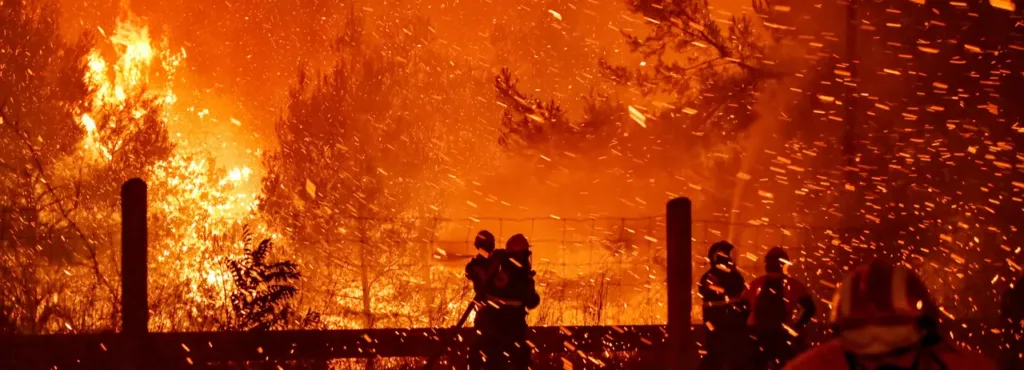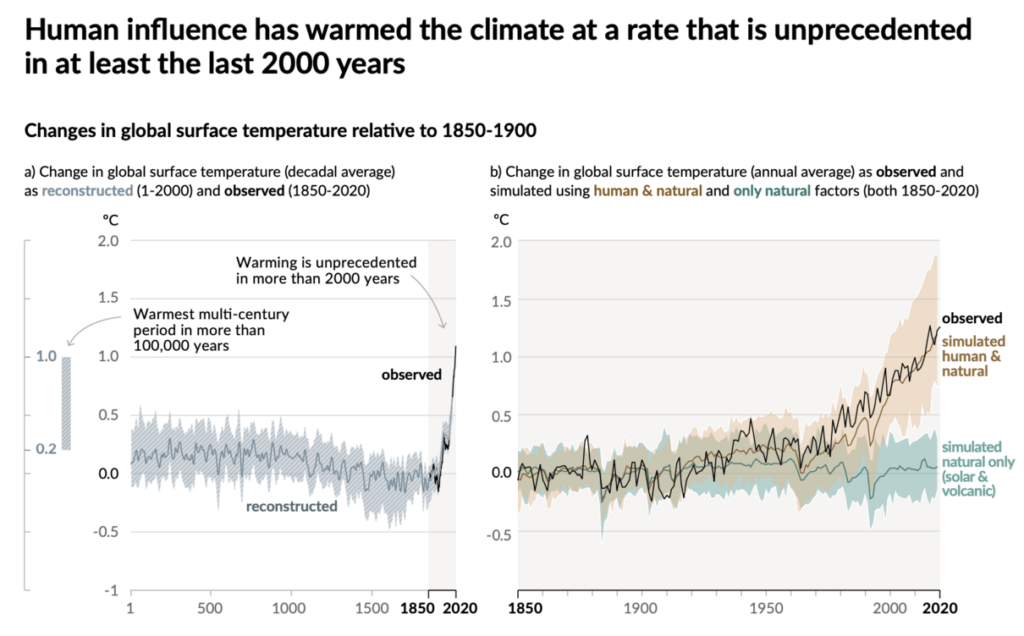‘Code Red for Humanity’: IPCC Report Warns Window for Climate Action Is Closing Fast
ENVIRONMENT, 16 Aug 2021
Jake Johnson | Common Dreams - TRANSCEND Media Service
“The alarm bells are deafening, and the evidence is irrefutable: greenhouse gas emissions from fossil fuel burning and deforestation are choking our planet and putting billions of people at immediate risk.”
9 Aug 2021 – A panel of leading scientists convened by the United Nations issued a comprehensive report today that contains a stark warning for humanity: The climate crisis is here, some of its most destructive consequences are now inevitable, and only massive and speedy reductions in greenhouse gas emissions can limit the coming disaster.
“Many of the changes observed in the climate are unprecedented in thousands, if not hundreds of thousands of years, and some of the changes already set in motion—such as continued sea level rise—are irreversible.”
—IPCC
Assembled by the Intergovernmental Panel on Climate Change (IPCC)—a team of more than 200 scientists—the new report represents a sweeping analysis of thousands of studies published over the past eight years as people the world over have suffered record-shattering temperatures and deadly extreme weather, from catastrophic wildfires to monsoon rains to extreme drought.
The result of the scientists’ work is a startling assessment of the extent to which human activity, particularly the burning of fossil fuels, has altered the climate, producing “unprecedented” planetary warming, glacial melting, sea level rise, and other changes that are wreaking havoc in every region of the globe—wiping out entire towns, imperiling biodiverse ecosystems such as the Great Barrier Reef and the Amazon rainforest, and endangering densely populated swaths of the world.
“This report is a reality check,” said Valérie Masson-Delmotte, a climate scientist at the University of Paris-Saclay and co-chair of the panel that produced the report. “We now have a much clearer picture of the past, present, and future climate, which is essential for understanding where we are headed, what can be done, and how we can prepare.”
One central finding of the new analysis is that the Paris accord’s goal of limiting global temperature rise to no more than 1.5°C above pre-industrial levels is in serious danger as policymakers fail to take the necessary steps to curb greenhouse gas emissions.
Each of the past four decades, according to the report, has been successively warmer than any preceding decade dating back to 1850, atmospheric CO2 has soared to levels not seen in two million years, and “global surface temperature will continue to increase until at least the mid-century under all emissions scenarios considered.”
“Global warming of 1.5°C and 2°C will be exceeded during the 21st century,” the IPCC panel warns, “unless deep reductions in carbon dioxide and other greenhouse gas emissions occur in the coming decades.”
“Many of the changes observed in the climate are unprecedented in thousands, if not hundreds of thousands of years, and some of the changes already set in motion—such as continued sea level rise—are irreversible over hundreds to thousands of years,” reads the report, which was approved by 195 member nations of the IPCC.
“However,” the report emphasizes, “strong and sustained reductions in emissions of carbon dioxide and other greenhouse gases would limit climate change. While benefits for air quality would come quickly, it could take 20-30 years to see global temperatures stabilize.”
Panmao Zhai, another co-chair of the IPCC working group, stressed that “stabilizing the climate will require strong, rapid, and sustained reductions in greenhouse gas emissions, and reaching net-zero CO2 emissions.”
“Limiting other greenhouse gases and air pollutants, especially methane, could have benefits both for health and the climate,” Zhai added.
The new report, the first of three installments, was released just weeks before world leaders are set to gather in Glasgow for the 2021 United Nations Climate Change Conference (COP26), which activists view as a pivotal moment for the global climate fight.
“Many see COP26 as our last, best chance to prevent global temperatures from spiraling out of control,” Dorothy Grace Guerrero of Global Justice Now wrote last month. “Unfortunately, we are not yet on track to limit global warming to 1.5°C, the threshold that scientists agree will prevent the most dangerous climate impacts. Failure to reach this goal will take a disproportionate toll on developing countries.”
António Guterres, secretary-general of the U.N., said in a statement Monday that the IPCC’s latest findings are “a code red for humanity.”
“The alarm bells are deafening, and the evidence is irrefutable: greenhouse gas emissions from fossil fuel burning and deforestation are choking our planet and putting billions of people at immediate risk,” said Guterres. “Global heating is affecting every region on Earth, with many of the changes becoming irreversible.”
“There is a clear moral and economic imperative to protect the lives and livelihoods of those on the front lines of the climate crisis,” Guterres continued. “If we combine forces now, we can avert climate catastrophe. But, as today’s report makes clear, there is no time for delay and no room for excuses. I count on government leaders and all stakeholders to ensure COP26 is a success.”
______________________________________________
This post has been updated with the IPCC’s proper name.
Tags: CO2, Climate Change, Deforestation, Environment, Forest fires, Fossil fuels, Glaciers, Global warming, Oceans, Paris Climate Agreement, United Nations
DISCLAIMER: The statements, views and opinions expressed in pieces republished here are solely those of the authors and do not necessarily represent those of TMS. In accordance with title 17 U.S.C. section 107, this material is distributed without profit to those who have expressed a prior interest in receiving the included information for research and educational purposes. TMS has no affiliation whatsoever with the originator of this article nor is TMS endorsed or sponsored by the originator. “GO TO ORIGINAL” links are provided as a convenience to our readers and allow for verification of authenticity. However, as originating pages are often updated by their originating host sites, the versions posted may not match the versions our readers view when clicking the “GO TO ORIGINAL” links. This site contains copyrighted material the use of which has not always been specifically authorized by the copyright owner. We are making such material available in our efforts to advance understanding of environmental, political, human rights, economic, democracy, scientific, and social justice issues, etc. We believe this constitutes a ‘fair use’ of any such copyrighted material as provided for in section 107 of the US Copyright Law. In accordance with Title 17 U.S.C. Section 107, the material on this site is distributed without profit to those who have expressed a prior interest in receiving the included information for research and educational purposes. For more information go to: http://www.law.cornell.edu/uscode/17/107.shtml. If you wish to use copyrighted material from this site for purposes of your own that go beyond ‘fair use’, you must obtain permission from the copyright owner.



Let us for a moment accept that Viktor Orban is right
“Hungary first, our country, our people, our culture, our language, our religion.
what then?”
A small country like Ireland takes his lead and follows suit.
Now after we have taken over control/responsibility the ‘buck stops here’
Ireland tackles its OWN climate change challenge HEAAD ON.
Whatever it takes, we go carbon neutral by 2030 no dependency on energy imports
and we achieve a ‘stand alone’ example to other countries of self determination.
With a tiny population of 5 million is is a doo-able goal that can be achieved. As an
island nation we can secure our borders allow only those we choose to enter our state
provide assistance in whatever form we can to those who are most in need and run our
country to meet the needs of all our people rather than the wants of the new landlord classes.
We can cut loose and go as a curragh alone or else, take our chances and go collectively with everyone
else on a cruise liner and rely on others to make the right decisions.z7
take our